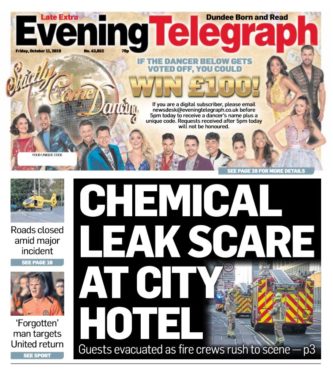It is 10.05am on a mild weekday and I have just spent 45 minutes foraging through five different newsagents from one end of Dundee city centre to the other in search of three newspapers and two magazines.
I am a peculiar millennial in that I love the print press.
Whether it is buying a newspaper from the frozen but friendly vendor in the street, that feeling of stretching wide open and folding a broadsheet to the annoyance of anyone else in close proximity or getting ink on my fingers, I love it.
I read widely and like opinions that conflict with my own, so my purchases today include The Daily Telegraph, the Financial Times and Dundee’s Evening Telegraph.
I also add in The Spectator and the New Statesman, costing me a grand total of £14.85.
A decade ago, I would have paid half the price for that collection and would probably have been able to get them all in the same newsagent.
The reason why this activity is so peculiar is because a decreasing number of my own generation do this any more.
But herein lies a dilemma: we hear of the decline of print media but the reality is some newspapers are becoming relentlessly inaccessible and, if you want a particular edition, you have to work increasingly hard to find it.
The reason for the decline, from my perspective, is not because people are less interested but the news they seek is harder to find in print, takes a great deal more effort and will cost you more to purchase when the very same news is more accessible, cost-free, online.
Paul Hutcheon, the outgoing political editor at The Herald, recently highlighted this point, stating that the public has a greater appetite for news, but is less willing than ever to pay for it.
>> Keep up to date with the latest news with Evening Telegraph newsletter
Describing a familiar picture to any regular traveller via public transport, he wrote: “En route to work in 2004, a sizeable proportion of passengers would be reading a newspaper purchased moments earlier.
“These days, they are either reading the (free) Metro or devouring content on their smartphones.”
Millennials like me, who will take a creaking bookshelf over a Kindle, are a declining breed.
And, truthfully, had it not been for decent English teachers who infused in me the value of quality journalism and inspired a fondness for a good opinion piece, I could have easily followed the generational herd.
Read more from Ewan Gurr here
The recent BBC Scotland series The Papers, which followed the Newsquest franchise, was a sad reminder of the threat that looms for many whose livelihoods rely upon the resilience of print media.
I do fear the day when I can no longer buy a newspaper and get inky fingers from the friendly vendor but, until then, I will savour these precious moments.

